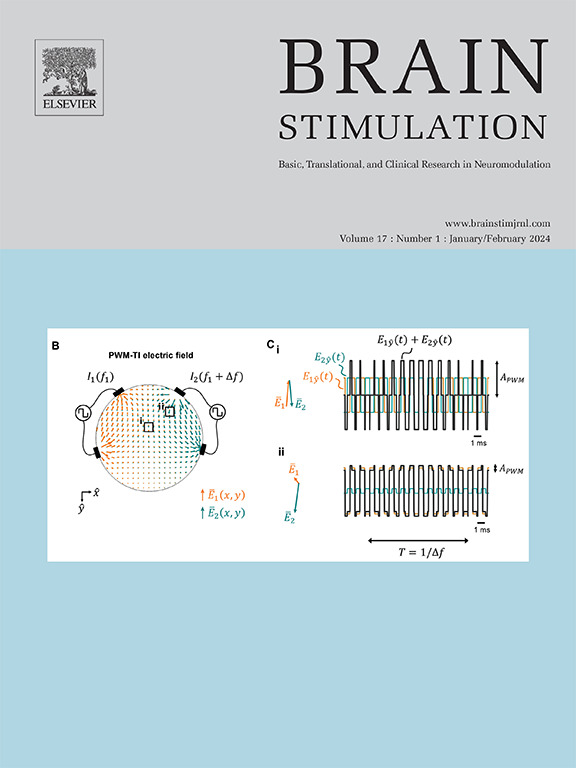穹窿相依赖的闭环深部脑刺激提供了海马θ波振荡的双向操纵
IF 7.6
1区 医学
Q1 CLINICAL NEUROLOGY
引用次数: 0
摘要
阿尔茨海默病(AD)的治疗选择非常有限,预防或逆转神经退行性变的治疗方法仍然难以捉摸。深部脑刺激(DBS)是一种将高频电脉冲连续传递到大脑特定部位的方法,已被作为阿尔茨海默病的实验性治疗方法进行了试验。在AD患者中,针对穹窿的连续高频DBS(固定DBS)已被证明是安全的,但在患者中并不可靠有效。在运动障碍中,高频DBS被认为是一种虚拟病变,破坏了病理生理活动。在阿尔茨海默病中,使用刺激来加强或重建被疾病过程破坏的振荡活动可能更有利。这种目标的主要候选是海马theta振荡,它为记忆处理提供了一个时间框架,并在AD的啮齿动物模型中发生了改变。材料和方法我们使用振荡跟踪算法,通过海马局部场电位(LFP)中正在进行的θ波振荡的不同阶段触发,对穿越线性轨迹的大鼠穹窿施加闭环电刺激。结果不同靶期刺激均能显著抑制或放大θ振荡,且这种抑制作用明显大于相同刺激模式的开环重播。不管动物的运动速度如何,θ波振荡的放大都可以实现,这表明它不是由行为改变的二次效应引起的。结论闭环固定起搏器是一种可行的调节海马θ波振幅的方法,可以应用于人类设备,提供一种建设性的干预措施,有可能增强AD患者的记忆回路功能。本文章由计算机程序翻译,如有差异,请以英文原文为准。
Phase-dependent closed-loop deep brain stimulation of the fornix provides bidirectional manipulation of hippocampal theta oscillations
Introduction
Alzheimer's disease (AD) has very limited treatment options and therapies to prevent or reverse neurodegeneration remain elusive. Deep brain stimulation (DBS), whereby high-frequency pulses of electricity are delivered continuously to a specific part of the brain, has been trialled as an experimental treatment for AD. In AD patients, continuous, high frequency DBS targeted to the fornix (fx-DBS) has been shown to be safe, but not reliably effective across patients. In movement disorders, high-frequency DBS is thought to act as a virtual lesion, disrupting pathophysiological activity. In AD, it may be more advantageous to use stimulation to reinforce or rebuild oscillatory activities that are disrupted by the disease process. A primary candidate for such a target is the hippocampal theta oscillation, which provides a temporal framework for mnemonic processing and is altered in rodent models of AD.
Material and methods
We applied closed-loop electrical stimulation to the fornix of rats traversing a linear track, triggered by different phases of the ongoing theta oscillation in the hippocampal local field potential (LFP) using the OscillTrack algorithm.
Results
Stimulation at different target phases could robustly suppress or amplify the theta oscillation, and these effects were significantly larger than those caused by open-loop replay of the same stimulation pattern. Amplification of the theta oscillation could be achieved irrespective of the locomotor speed of the animal, showing that it did not result from a secondary effect of behavioural change.
Conclusions
Our findings demonstrate that closed-loop fx-DBS is a viable method of modulating the amplitude of hippocampal theta oscillations that could be applied in human devices to provide a constructive intervention with the potential to boost memory circuit function in AD.
求助全文
通过发布文献求助,成功后即可免费获取论文全文。
去求助
来源期刊

Brain Stimulation
医学-临床神经学
CiteScore
13.10
自引率
9.10%
发文量
256
审稿时长
72 days
期刊介绍:
Brain Stimulation publishes on the entire field of brain stimulation, including noninvasive and invasive techniques and technologies that alter brain function through the use of electrical, magnetic, radiowave, or focally targeted pharmacologic stimulation.
Brain Stimulation aims to be the premier journal for publication of original research in the field of neuromodulation. The journal includes: a) Original articles; b) Short Communications; c) Invited and original reviews; d) Technology and methodological perspectives (reviews of new devices, description of new methods, etc.); and e) Letters to the Editor. Special issues of the journal will be considered based on scientific merit.
 求助内容:
求助内容: 应助结果提醒方式:
应助结果提醒方式:


